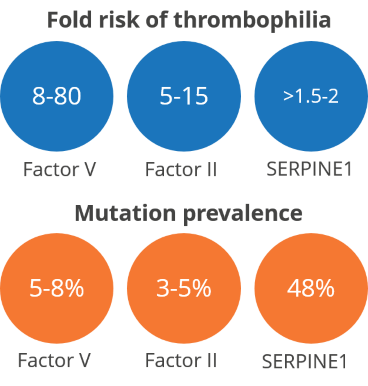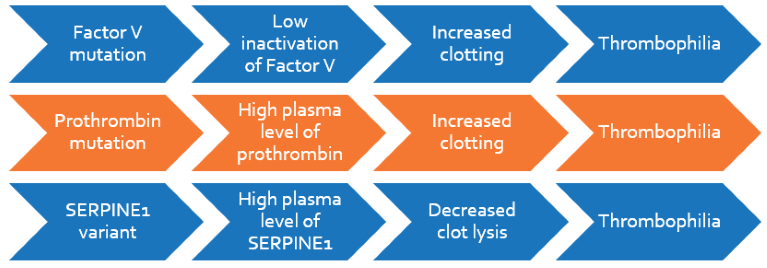 Thrombophilia, or hypercoagulability, is the increased tendency of blood to clot
Thrombophilia, or hypercoagulability, is the increased tendency of blood to clot
These genetic mutations can cause heart attack or stroke in the absence of conventional risk factors
Cardio/Cerebrovascular disease
Myocardial infarction (heart attacks) and strokes are seen in an increasing frequency in young people and in those without conventional risk factors for heart disease. Recent studies indicate that genetic variations leading to thrombophilia or hypercoagulabilty (abnormal blood clotting) may be closely linked to heart disease and stroke. Patients, especially, below the age of 50 are at high risk. This test is also useful for those with venous thrombosis and/or pulmonary thromboembolism to diagnose the cause, predict risk and manage disease better.
Tailored therapy with anti-thrombotics
Depending on the level of risk and clinical history, anti-thrombotics may be necessary to prevent recurrence of cardio/cerebrovascular events, myocardial infarction, stroke, venous thrombosis and thromboembolism.
Several other conditions can also influence thrombophilia, such as pregnancy, which increases the tendency almost 100-fold. Awareness of risk enables better clinical management of such conditions.
Genetics of thrombophilia, and FAQs
Thrombophilia or hypercoagulability, refers to increased tendency of the blood to clot. There are several factors that contribute to thrombophilia. Thrombophilia may be associated with cardiovascular and cerebrovascular conditions such as myocardial infarction and stroke. Hereditary genetic mutations of three particular genes are among the most important causes of thrombophilia: Factor V, Factor II prothrombin, and plasminogen activator inhibitor, SERPINE1 (PAI-1).
The test categorizes individuals for risk of thrombophilia by genotyping Factor V (Leiden, 1691G>A), Factor II prothrombin (20210G>A), and SERPINE1 (4G/5G) using allele-specific real-time PCR. The method has almost 100% analytical accuracy and sensitivity. Relatives of the affected individual are recommended this test to assess the risk of thrombotic events.

References
Grody WW et al. 2001, Genetics in medicine
Hickey SE et al. 2013, Genetics in Medicine
